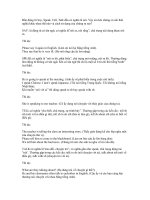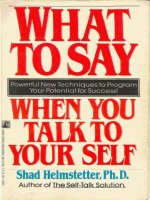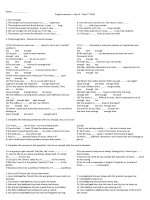Say, speak, tell, talk
Bạn đang xem bản rút gọn của tài liệu. Xem và tải ngay bản đầy đủ của tài liệu tại đây (199.26 KB, 41 trang )
Say, Speak, Tell, Talk
Forms
Meanings
Example
S
P
E
A
K
Speak (st)
Speak to sb
1)Languages
2)One-way com.
3)Exchange:
Formal/serious
situation
1)He can speak English.
2)I’m wrong. I should speak to her
tomorrow.
3)In the meeting yesterday, the
president didn’t speak anything.
T
A
L
K
Talk to/with sb
about st
Informal com.
1)We are talking happily to each other.
2)I have to talk to you about some
secrets.
T
E
L
L
Tell sb to do st
“instruct” meaning
Tell sb (about) st “inform” meaning
Tell sb that clause
1)My father told me to go to visit my
grandpa.
2)My girlfriend is telling a terrible
ghost story.
3)She rarely tells me about her life.
4)He told me that I would be dismissed.
S
A
Y
Say st to sb
Say that
1)I don’t want to say “goodbye” to her.
2)People say that smoking is a bad
habbit.
Pronounce words
to express
thoughts, ideas,
suggestion or state
Go vs. Come
Go/ went/ gone
Ex.
Come/ came/ come
Return
To go back??? ^.^
Position Go there.
Go away from me, please.
To come back???
Come here.
Come to me, please.
Formal Leave/ left/ left
Arrive / arrived/ arrived
Usage
Đề nghị đi cùng ai đó đến đâu
Đề nghị được đi cùng ai đến đâu
I’ll go to the theatre with you.
I’ll come to the theatre with you.
Bắt đầu/ chuẩn bị đến hay trên
Đến được nơi nào rồi
đường đến
Now I am going to the theatre.
Now I am coming to the theatre.
Go/ went/ gone
Usage
Come/ came/ come
Điện thoại: Người nói đang ở vị trí A, người nghe
đang ở vị trí B, nếu người nói bảo đến nhà người
nghe (B) thì dùng “come”
Ex: I’ll come to your house.
Điện thoại: Người nói đang ở vị trí A, người nghe đang ở vị trí B, nếu người
nói bảo đến vị trí C nào khác thì dùng “come” hoặc “go”
Ex: Let’s come to Tom’s house.
=
Let’s go to Tom’s house.
Do vs. Make
Do/ did/ done
Intro. - Trợ động từ (Auxilary verb)
What do you do?
Make/ made/ made
- Động từ thường (General
verb)
- Động từ thường (General verb) I’ll make a cup of tea for you.
What do you do?
Do/ did/ done
U
Do + task (những hoạt động hàng ngày)
S
Make/ made/ made
Make for constructing, building or
creating you can touch
A
-
To do a job
-
To make noise
G
-
To do the housework
-
To make food
E
-
To do my/ your homework
-
To make coffee/ tea
-
To do the washing: giặt quần áo
-
To make breakfast/ lunch/ dinner/
-
To do the washing – up = to clean the
supper
dishes
-
To make a photocopy
-
To do the gardening
-
To make a film/ video
-
To do some exercises
-
To make a mess
-
To do the moring/ evening exercise
-
To do the ironing
Do/ did/ done
Make/ made/ made
-
To do your best = to try your best
-
To make a speech
-
To do business (with)
-
To make a mistake
-
To do (sb) harm
-
To make a phone call = ring sb = call sb = phone sb
-
To do good
-
To make a profit
-
To do a favour = help
-
To make money = to earn money
-
To do time = to go to prison
-
To make friends with sb
-
To do research = to research
-
To make a fool of sb:
-
To do one’s dutie
-
To make a choice
-
To do sth for a living
-
To make a decision = to decide
-
To do chores
-
To make a difference = to differenciate
-
To do exam = to take exam
-
To make an effort
-
To make an excuse
-
To make arrangements
-
To make plans
-
To make use of = to take advantage of
-
To make an impression
-
To make a contribution to
Do/ did/ done
Structures
Make/ made/ made
What do you do?
To make + O + (V) + Adj
= What is your job?
Ex 1: He made me feel bored.
Ex 2: He always makes me angry.
Take – Bring – Carry
Person - People
RELATIVE CLAUSE
Use
who
which
which
whose
subject or object pronoun for
people
subject or object pronoun for
animals and things
referring to a whole sentence
possession for people animals
and things
Example
I told you about the woman who lives
next door.
Do you see the cat which is lying on the
roof?
He couldn’t read which surprised me.
Do you know the boy whose mother is a
nurse?
whom
object pronoun for people,
especially in non-defining
I was invited by the professor whom I
relative clauses (in defining
met at the conference.
relative clauses we colloquially
prefer who)
that
subject or object pronoun for
people, animals and things in
I don’t like the table that stands in the
defining relative clauses (who or kitchen.
which are also possible)
Relative Adverbs
Relative
Adverb
Meaning
Use
Example
when
refers to a time
in/on which
expression
the day when we met
him
where
in/at which refers to a place
the place where we
met him
why
for which
the reason why we
met him
refers to a reason
THE ROLE
• 1. When the relative pronounce (who,
which, that) acts as subject of the relative
clause: it CANNOT be omitted
• 2. When the relative pronounce (who,
whom, which, that) acts as the object of
the relative clause it can be omitted
DEFINED vs. UNDEFINDED
• 1. Undefined relative clause: Mệnh đề quan hệ không
xác định dấu phẩy được đặt sau thành phần mà
(CANNOT be replaced by that)
a. Bổ sung ý nghĩa cho danh từ CHỈ CÓ MỘT!
My mother, who works as a representative of a famous
company, is very active.
b. Bổ sung ý nghĩa cho danh từ riêng:
Have you talked to Ms. Chan, who is going to fly with you
to Bangkok?
Hanoi, where I was born, is the capital of Vietnam.
c. Bổ sung ý nghĩa cho cả câu
Eliot failed his past exam; which upset his parents greatly.
DEFINED vs. UNDEFINDED
2. Defined relative clause: Mệnh đề quan hệ xác định
The person who works as a representative of NWY
Company is my husband’s friend in high school.
= The person that works as a representative of NWY
Company is my husband’s friend in high school.
The city where Jack grew up in has many nice
landscapes.
= The city that Jack grew up in has many nice
landscapes.
INVERSION
1. Đảo ngữ với NO và NOT
No+ N + auxiliary+S+Verb(inf)
Not any+ N+ auxiliary+ S+ verb(inf)
Eg: No money shall I lend you from now on. ( I shall
lend you no money from now on)
= Not any money shall I lend you from now on ( I
shall not lend you any money from now on).
2. 2. Đảo ngữ với các trạng từ phủ định: Never, Rarely,
Seldom, Little, Hardly ever,.....
Never/ Rarely/ Seldom /Little/ Hardly ever+
auxiliary+ S+ V
Never in mid-summer does it snow,
Hardly ever does he speak in the public .
3. Đảo ngữ với ONLY
a) Only once : chỉ một lần
I have seen ShrekI only once.
Only once have I seen ShrekI.
b) Only later: chỉ sau này, mãi đến sau này
-Mary did not know she was an adopted child until
later.
Only later did Mary know she was an adopted
child.
-They did not realize Tom was the stealer until
later.
Only later did they realize Tom was the stealer
3. Đảo ngữ với ONLY
c) only in this way : chỉ theo cách này
only in that way : chỉ theo các đó
-We can only achieve our goal in this way.
Only in this way can we achieve our goals.
-Our group will be able to solve the problem
only in that way.
Only in that way will our group be able to
solve the problem.
d) only then + auxiliary+ S+ V
3. Đảo ngữ với ONLY
e) only after+ N
only with+ N
f) only by V_ing/ N : chỉ bằng cách
Only by working hard will we become
millionaires someday.
Only by practicing English everyday can he
speaks English fluently.
Only by treating people nicely will you be
treated well in return.
Only by working out regularly can we keep fit.
3. Đảo ngữ với ONLY
g*. only when+ clause : chỉ khi mà...
only after +clause: chỉ sau khi...
only if+ clause: chỉ khi...
** Lưu ý: Mệnh đề đứng ngay đằng sau “only when”,
“only after”, và “only if” thì không được đảo ngữ,
mà phải đảo ngữ ở mệnh đề thứ hai.
Xem xét kỹ các ví dụ dưới đây
Only when I took an English class at Beonline did I
like English.
(= I only liked English when I took an English class at
Beonline).
3. Đảo ngữ với ONLY
Only after the children have finished dinner will they
be allowed to watch T.V.
(=The children will be allowed to watch TV only after
they have finished dinner).
Only if you promise to keep secret can I tell you this
story.
(= I can only tell you this story if you keep promise).
h) only in adv of time/ place
Only in his house does he feel safe.
(= He only feels safe in his house).
• 4. Đảo ngữ với các cụm từ có No
At no time: không khi nào
On no condition : trong điều kiện gì…. Cũng không…
On no account + auxiliary+ S+ N : không vì lý do gì
Under/ in no circumstances : trong hoàn cảnh nào
cũng không ...
For no season : không vì lý do gì
In no way
No longer : không còn... nữa
For no reason shall you skip class.
The money is not to be paid under any circumstances
= Under no circumstances is the money to be paid
On no condition shall we accept their proposal









